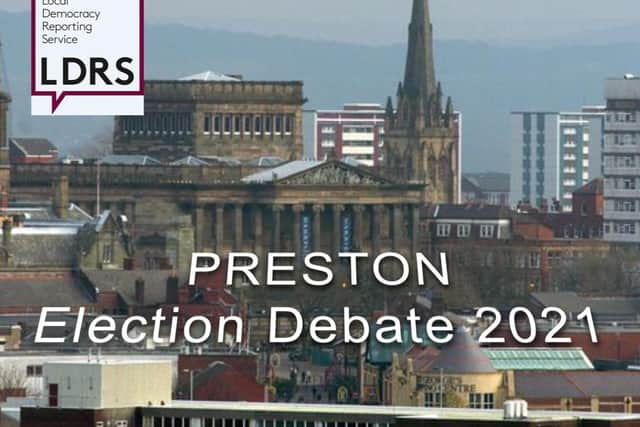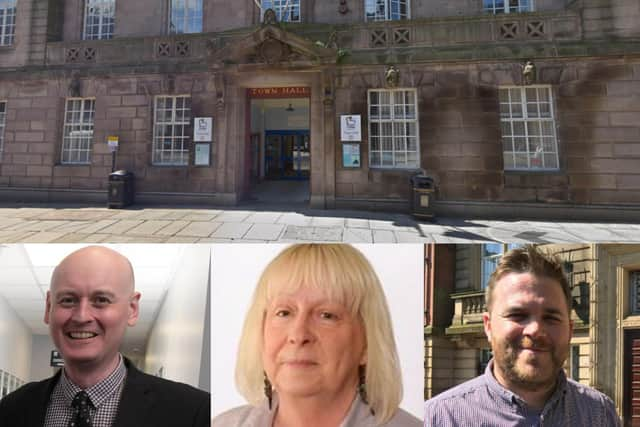Preston City Council elections 2021: The Big Debate
and live on Freeview channel 276
You can watch the full debate in the video above or read the highlights below.
Taking part in the event were Cllr Matthew Brown (Labour, Leader, Preston City Council), Cllr Sue Whittam (Conservative group leader) and Cllr John Potter (Liberal Democrat group leader).


PANDEMIC RECOVERY
Advertisement
Hide AdAdvertisement
Hide AdPreston’s politicians set out their visions for a post-pandemic future, after a year which has seen the city one become one of the areas hardest-hit by the Covid crisis.
Sue Whittam: “It’s going to take a long time. Obviously there are ambitions for things to happen [in the city centre], but [the pandemic] stalled a lot. I do think we should have free car parking at night – we should get the night-time economy back up and running. It can’t just be about shops anymore, it has to be about residential. The Harris being regenerated is fantastic, but that will take three years. We need…people coming in, doing a bit of shopping, going out for a nice meal – let’s get the Guild Hall, at some stage, back up and running. We are really well-off culturally [in terms of] buildings in Preston – we really need to make the most of what we have got.”
Matthew Brown: “The co-operative spirit has really come out during the pandemic – people realise what’s important, which is each other. I think it’s a big opportunity to tackle the environmental crisis – I’m going to be making the argument potentially to move towards pedestrianisation of the city centre, I think that’s a very good idea. We have got to continue promoting flexible working. We have got to tackle poverty in Preston – that’s a huge part of [the recovery]. I think also [there will be] a cultural renaissance – we have secured some funding for Preston Live [and] obviously we have got plans for the Harris. We want to have entertainment and expression and creativity on our streets – that will lead us to be really vibrant going forward.”


John Potter: “One of the good things from this last year is how more people have rallied around charities and the third sector. The amount of work these places do has been absolutely phenomenal and has kept some people going during lockdown – and we should absolutely praise that. One thing we need in the city is more of a cultural base. Lancashire does suffer from a [lack of] a particular identity. If you go to Manchester or Liverpool, they are very much enriched with their identity, while Lancashire has been very divided. We need to really boost the Preston identity within our city – whether that’s great things like Wallace and Gromit or our fantastic history of innovation, we need to push that forward.”
CLIMATE CHANGE
Advertisement
Hide AdAdvertisement
Hide AdThe city council has declared a climate emergency and is committed to being carbon neutral by 2030 – but what needs to be done to achieve it?
John Potter: “At the moment Preston isn’t doing enough. Our recycling rate is poor, we haven’t even got an officer to look into climate change on a permanent basis – something we put forward at the budget. There will be uncomfortable choices we have to make – some people are going to have to be paying more and we’re going to have to get fewer cars driving into our city centre. [The Lib Dems] submitted to the local plan [consultation] all the things we wanted to see – a net biodiversity increase on every planning application, low carbon homes, every house to have electric car ports.
Sue Whittam: “Even if we have cars, we can put electric charging points on the car parks – we can put in bike racks if people are going to be cycling more through Preston. I think there is a mutual marriage, in a lot of ways, of both. You can’t go from having cars… to nothing, as much as many would like that. I’m a great supporter of trams – I would love to have a tram system in Preston – that would be absolutely fantastic and it would look great for the city.”
Matthew Brown: “We’re refreshing our local plan [and] looking at how we can get net-zero [carbon] on all our developments – if this Conservative government allows us to. We have got it in our manifesto [a plan to] explore a workplace levy – that means employers in Preston, where they have more than ten people who drive to work and park in the boundary, they have to pay a little more that then goes into public transport. We’re open-minded to look at that. In Nottingham that really did reduce carbon emissions and improve the health of the community.”
PLANNING
Advertisement
Hide AdAdvertisement
Hide AdPreston City Council is currently locked in a battle with developers over targets dictating the minimum amount of housing that should be built each year – and whether the city can show it has a rolling five-year supply of land available to meet its needs. The authority is contesting seven appeals from housebuilders over the refusal of applications to build more than 600 homes to the rural north of the city.
Matthew Brown: “The difficulty we have is that the planning system is now rigged in the favour of developers…… and it’s actually very difficult to defend what we need to do, but we are doing it with the powers that we have. [An] example is the principle of sustainable development – it’s a lot easier for housebuilders to build houses where they want. [Also], if developers say they are not making 15-20 percent profit, then they can avoid providing affordable housing. It’s those principles that we’re fighting against.
John Potter: “[With] so much of planning, your hands are tied from central government. The government changes its rules every other month, it’s been really difficult. [The government’s planning white paper] would be a disaster if it goes ahead – and I’m really surprised [they haven’t] ditched it yet. Talk about hands tied – what that would do is also gag and blindfold anyone [from having] a say on the details of planning applications. It’s an absolute destruction of the local democratic process.”
Sue Whittam: “What lets us down is the five-year supply – it all comes down to figures and arguing about what planning permissions have been passed and whether they will actually come to fruition. The new white paper actually gets rid of the five-year supply debacle, which is a positive move. I do my utmost trying to get the best deal for Preston, because I honestly believe there is a north-south divide when it comes to planning. And I’m not afraid to say when the government gets it wrong.”
PRESTON MODEL
Advertisement
Hide AdAdvertisement
Hide AdMatthew Brown hailed what he says is the success of Labour’s community wealth building policies, designed to generate and keep cash within the city – but his Conservative and Liberal Democrat opponents want evidence that the so-called ‘Preston Model’ lives up to the claims made about it by the ruling group.
Matthew Brown: “A big part of it is philosophical, but it’s also really common sense in [that] we want to make sure our big institutions spend with locally-based businesses. If a public pound goes to a local small construction company, you’ve got a family of subcontractors – and you actually get more jobs than it going to a big corporation.”
Sue Whittam: “Spending local – I’ve got no problem with that at all. But you do need the evidence that community wealth building is working. My Dad was a hod carrier in the construction industry. He was a Preston man and worked in Preston all his life – that wasn’t [because of] community wealth building. We need the evidence to back it up – it seems to be a lot of spin and talk. How do we know it’s not linked to the City Deal, which has done fantastic stuff?”
John Potter: “Labour loves to take credit for good things that happen in the city and say it’s down to the Preston Model, but we have no idea – [there is] no proof whatsoever whether they are driving these positive outcomes or they’re just passengers along the ride. The only thing they don’t take credit for under the Preston Model is if North End win. You have no proof that [certain contracts] definitely would have gone to companies [outside Preston] – you just assume that they would.”
Advertisement
Hide AdAdvertisement
Hide AdMatthew Brown: “There is lots of evidence. The hospital bought masks with a Preston-based company during the pandemic – and that’s created 90 jobs. [The city council] was the first Real Living Wage employer and, through the Preston Model, influences other big institutions – there are now 40 or 50 employers [paying it].”
PRESTON BANK
As part of another community wealth building initiative, Preston City Council is planning to create a North West mutual bank with fellow local authorities in Liverpool and Wirral. It will offer accounts and loans only to businesses and individuals in the region and Preston has earmarked a £1m contribution to its start-up costs. However, Liverpool City Council was recently the subject of a damning inspection report which criticised the way the authority has operated.
Sue Whittam: “For the sake of Preston and Preston people, it’s foolish to carry on at the moment with that scheme when you could just put it on hold and concentrate on the cinema [development] and do some of the other things that you have planned, which actually I support. But I don’t support the bank – I’m sorry, I can’t. At the moment, [Liverpool] seems a very difficult [authority] to be in bed with.”
Matthew Brown: “There has been a small amount of money spent by all three councils – before the current investigation into the former mayor of Liverpool* – around due diligence. We are saying in the Labour party that things need to change, we can’t just skirt around the edges. What about the people [who pay a] poverty premium of £1000 per year, what about the local businesses who are seeing bank branches disappear? There is a strong evidence base not-for-profit banking…will actually lend to local businesses. And we are the gatekeepers – this will be a one-member-one vote bank.”
Advertisement
Hide AdAdvertisement
Hide AdJohn Potter: “The money you’re going to put in…you have no control over that. Once you give away this money from Preston City Council, it is a commercial entity and [there is] no guarantee any of the benefits will happen in Preston at all. Your own report [on the issue] says that. Councils aren’t exactly flush with money – we would much prefer kids get to school without pollution in their lungs than [have] a community bank that we think would probably fail anyway.”
*Former mayor of Liverpool Joe Anderson is no longer on police bail, having been arrested last December on suspicion of conspiracy to commit bribery and witness intimidation. He remains under investigation, along with four other individuals, but has not been charged with any offence and denies any wrongdoing.
Please consider subscribing to the Lancashire Post to support local journalism and help secure its vital role across Central Lancashire. Visit lep.co.uk/subscriptions. Thank you.
.
Comment Guidelines
National World encourages reader discussion on our stories. User feedback, insights and back-and-forth exchanges add a rich layer of context to reporting. Please review our Community Guidelines before commenting.
